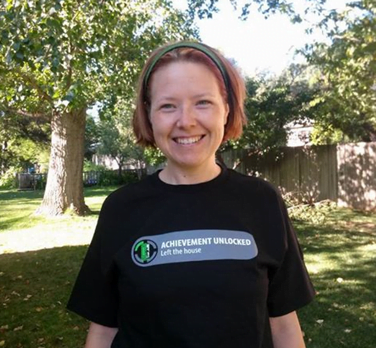My husband has been joking for years that my brain has 4 processors. He says I can’t relax unless at least 3 processors are turned off, but that’s not an easy thing to do. When one processor can’t solve the problem it is stuck on, my brain brings up the next-most-interesting processor and begins working on that problem instead.
Often, I wake up at 5am to find that one processor has kicked out a solution to a problem and then it is impossible to go back to sleep. Sometimes I can’t sleep because the processors are occupied with such interesting problems they won’t turn off.
The interesting part is what happens if I do not have enough interesting topic matter to supply to the 4 processors. They don’t seem to redistribute existing problems and work in parallel. The other processors are uninterested if one processor is handling the problem. Rather the remaining processors become unsatisfied and depressed – they feel under-appreciated and unfulfilled.
Recently, I read The Neogeneralist, by Kenneth Mikkelsen and Richard Martin. Neogeneralist “are people who are able to find connections across fields, to continuously learn specialties and apply their learnings across disciplines.” As I try to figure out how I want to be spending my time (for neogeneralists, where you go is what you do), I’m starting to frame this problem as a 4-processor issue. Suppose I can (have to) focus on four major areas/problems/realms.
As Director of Learning Design at WGU, there were four major realms my brain worked on:
- Instructional Design
- Learning Technology Design
- Infrastructure/Organization Design
- Process Design
While these were all worthy problems, I felt increasingly locked into the job in a way that made me feel as though I was suffocating. None of the problems gave me the chance to interact directly with learners or faculty (which is odd, I know). In this position, I was solving problems every day, but so far removed from “users” (students) that I couldn’t ever see whether the solutions would bear fruit, even at a small scale. I am used to having a “petri dish” to experiment in (a MOOC to teach, a course at a college). While my job originally encompassed “Improve Learning at WGU,” there became organizational and technological barriers to actually improving learning from this position as the organization grew and reorganized.
The other thing (but pretty normal at a growing organization) that happened at WGU was that we began to carve out some of these major realms of focus to other parts of the organization. Theoretically, this would be great because as an employee I’d have more time to focus, but here’s the reality of what happened:
- Processor 1 is unfulfilled and sad
- Learning Technology Design
- Processor 3 is unfulfilled and sad
- Processor 4 is unfulfilled and sad
Normally, this is where I would find some other project to work on in my free time to keep a processor or two occupied, but WGU had a very strong “no outside work” policy. There was a startup I wanted to spend time pursuing, but this would be “outside work.” I could teach as an adjunct somewhere, but this would be “outside work.” On top of that, Processor 3 became completely occupied/obsessed with a fundamental problem of the design of the organization and could not find any way out of the problem (and also lacked a position with any possible influence over this issue).
- Processor 1 is unfulfilled and sad
- Processor 2 is trying to figure out what job actually is
- Processor 3 is trying to solve organizational design and is stuck in an infinite loop
- Processor 4 is unfulfilled and sad, starts to catastrophize about T presidency
As organizations grow, they necessarily want employees to be more focused and less of generalists, but that is a problem if you happen to be a neogeneralist. Our unique abilities come from being experts in several areas and using cross-pollination of those areas to solve problems. If you’re going to shut down our ability to focus on multiple areas at work, don’t also shut down our ability to seek out new and interesting problems in our free time. It’s going to end in disaster.
Self-employment can also be rough, because if your processors aren’t fully occupied, then at least one of them will spend time in panic mode about not finding enough work. For the first month, the processors were occupied like this:
- Startup
- Trying to find clients to sustain income
- Trying to find long-term plans that would still work if 1 & 2 fail
- Unfulfilled and sad
Now onto the new problem. If I intentionally design my life, what do I really want the processors to be occupied with? Are they all fulfilled? Can I convince cofounders, investors, etc that I am simply not going to be happy with extreme focus? Probably most people keep at least one processor completely focused on their children, but I don’t have childeren. So I really do have 4 to allocate.
I also have a pretty strong history of allocating 4 processors. Here’s the processor allocation for my undergraduate work (I got 3 degrees while working close to 30 hours a week):
- Math
- Chemistry
- Biology
- Improving learning (TA, tutor, grading papers – payed the bills)
Here’s the processor allocation for my Masters graduate work (2 degrees, plus working):
- Math
- Business
- Improving learning (TA, adjunct for another college, doing learning research)
- Math curriculum work (writing texts, learning the assessment world, curriculum production)
Here’s the processor allocation for my PhD work (1 degree, full time faculty, consulting on the side). I still feel sorry for my PhD advisor for having to “manage” me. There were two years where “PhD” basically got bumped out when something in category 3 became a full-time processor job for a time.
- Teaching for MCC (5-5-2 load, typically 2-3 preps a term)
- Improving learning (experimenting, reading, writing, speaking)
- Math curriculum work (writing curriculum, building paper and digital math games)
- PhD Higher Ed Leadership
So what am I doing now?
- Startup (curriculum / learning design)
- Client work (product management / UX / LX, software) – also pays the bills 🙂
- Improving learning (teaching, reading, writing, speaking)
- Math curriculum work – also pays the bills and an area where I have a lot of time invested
As the startup grows, it will likely have to occupy more than one processor, and then the hard part – what goes? I don’t think I will be happy if I “improving learning” is not a category. It seems to be a consistent theme throughout the last two decades. My brain finds “Improving Learning” to be a fun distraction – what others might consider something akin to a “hobby” (though to most people, it is a job not a hobby).
I have strategies for managing conflicting priorities (good ones, in fact). I’ve always had strategies that keep my brain balanced.
If you’re still reading, wow. This is really an attempt to work through my own “post mortem” of why I felt so compelled to leave WGU a few months ago. There were a few other reasons (loss of authority, changes in leadership, nasty colleague) that probably just pushed me over the edge of the cliff, but not worth sharing the details – those things happen and there wasn’t anything I could do to change things. If I had been fundamentally happy, I would have stayed.
I’m trying to do a more intentional “Life Design” now, which I’ve come to realize is possibly different than what we traditionally consider “work life” balance. Yes, I should get exercise every day (I do). Yes, I should spend time with friends and family (I do). But those are necessary conditions, not sufficient ones. Sufficient, for me, means having a brain that is fully occupied solving problems that makes it happy.








